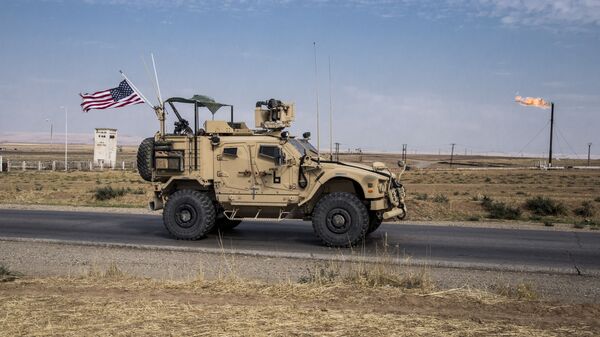- Just How Much Oil is Trump Talking About?
- Before the War
- From Oil ‘Fire Sale’ to Stolen Oil on Fire
- US Moves In
- Russian Oil Interests in Syria
- The Sooner Syria’s Energy Sovereign is Regained, the Better
Speaking to reporters late last week, US President Donald Trump told reporters that although he has been pulling troops out of Kurdish-held areas in northern Syria, the US has “stayed back and kept the oil” in northeastern Syria. “I like oil. We’re keeping the oil,” he emphasised.
Just How Much Oil is Trump Talking About?
On October 26, the Russian Defence Ministry held a briefing, revealing that Russian military intelligence had discovered that “leading American corporations,” working together with private military contractors and supported by US special forces and air power, were generating over $30 million a month in revenues by smuggling out of Syria from the oil-rich province of Deir ez-Zor.
But although Syria was never a major Middle Eastern energy power to begin with, even $30 million a month is just a fraction of the country’s potential output.
Before the War
In the late 2010s, before Syria descended into a foreign-backed civil conflict on the wave of the so-called ‘Arab Spring’ protests, the country’s oil and gas industries earned billions of dollars in revenues, contributing to upwards of 20 percent of state revenue and about 35 percent of Syria’s export earnings, and allowing the country to enjoy self-sufficiency in oil supplies, while depending on imports for just a fraction of its natural gas needs.
According to US Energy Information Administration data, the country produced an average of about 400,000 barrels of oil per day in 2009, with this output worth up to $730 million a month based on current oil prices, not accounting for production and transport costs.
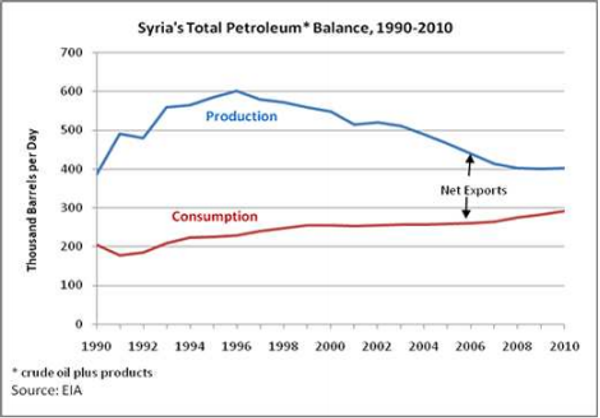
As the country was consumed by war, a hodgepodge collection of anti-government militants and jihadist terrorists began chipping away at Syria’s oil and gas output, taking control of broad swathes of territory, including the country’s hydrocarbon-rich centre and northeast, and shutting down or otherwise disrupting production and transport, as well as electricity generation capabilities.
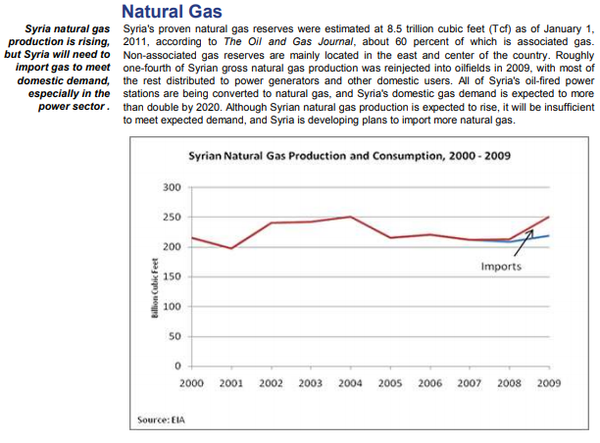
By 2013, total oil production had dropped to 59,000 barrels a day, and a year later, dropped further to just 33,000 barrels per day, or 8 percent of the country's pre-war output. It was at this time that Daesh (ISIS)* began setting up its ‘caliphate’ in western Iraq and northern Syria, capturing with it about three quarters of the Arab Republic’s oil reserves in the oil-rich province of Deir ez-Zor.
From Oil ‘Fire Sale’ to Stolen Oil on Fire
Between 2014 and 2015, Daesh took advantage of Damascus’s inability to dislodge the terrorists, pumping millions of barrels of oil out of the al-Omar, al-Tanak, al-Dhafra and other oil facilities and smuggling them out of the country in commercial tanker trucks, with the black gold sent to Turkey and Jordan, and supplies sold at cut rates of between $15 and $60 a barrel, well below market prices. The terrorists were able to continue their illegal oil trade in spite of the US-led anti-Daesh coalition’s operations in the area, which saw over 5,500 airstrikes taking place between August 2014 and August 2015.
After joining Damascus in the anti-Daesh fight in September 2015, and following several weeks of intelligence gathering operations, Russia turned off the taps of the terrorists’ profitable oil theft venture once and for all in December 2015, destroying over a thousand oil tankers, 32 refineries, and close to two dozen pumping stations, and severely cutting down the terrorists’ oil revenues, once estimated to be as high as $2 billion a month, to about $1.5 million a day, with these amounts reduced further as Syrian and Iraqi forces advanced.
US Moves In
However, despite the Russian air force doing most of the heavy lifting in undermining the terrorists’ oil financing, the strategic situation on the ground, and the Syrian Army’s need to liberate population centres in the western part of the country before moving east, ensured that the Kurdish-led Syrian Democratic Forces and their US allies took control of most of the country’s northeast, including the oil-rich territories east of the Euphrates River. This included the Al-Omar oilfield, and the massive al-Tabia gas field, which has the capacity to produce up to 13 million cubic meters of gas per day. Both of these fields are situated in Deir ez-Zor province.
On October 26, 2019, Russian Defence Ministry spokesman Maj. Gen. Igor Konashenkov reported on the extent of the US smuggling operation, revealing that an oil export contract under the US-controlled company ‘Sadcab’ was seeing income flowing in as a result of illegal smuggling going directly into the bank accounts of private military contractors and US intelligence agencies.
Citing satellite data, Konashenkov revealed numerous previously unknown details about the extent of the US-led operation, reporting, for example, that the US was engaged in importing oil production equipment into Syria, bypassing Washington’s own comprehensive energy sector sanctions against the country.
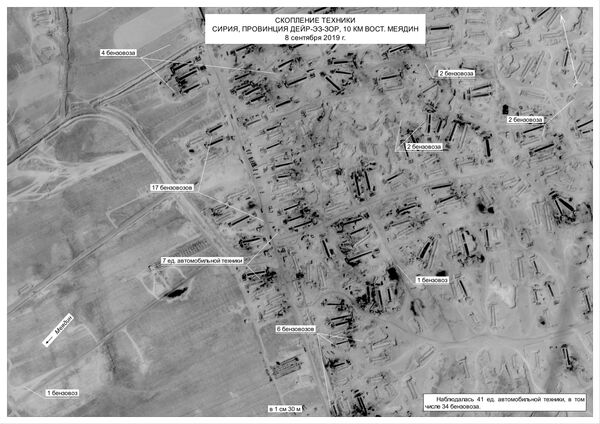
The officer suggested that with a monthly revenue of over $30 million, the Pentagon, CIA and private contractors would be “ready to ‘guard’ Syrian oil wells from ‘hidden Daesh cells’ indefinitely,” and described the US operation in the country as nothing short of “international state banditry.” Syria’s oil, Konashenkov stressed, belongs to Damascus, and not to Daesh or to “American protectors from Daesh.”
Russian Oil Interests in Syria
Like the US, Russia is also engaged in operations involving Syria’s oil, but with one important difference: Russian companies pen their contracts only with the UN-recognised government in Damascus.
Last month, for example, Russian media reported that Uraltekhnostroy, a fuel and energy industry services company producing pump stations, gas field equipment, oil, water and gas treatment units, was planning to resume construction of an oil production station in northeastern Syria whose construction had been halted in 2011. The company is presently negotiating with Syria’s ministry of petroleum and natural resources, and has also offered its expertise in restoring Syria’s other oil facilities, as well.
And the need to restore Syria’s energy sector hasn’t been limited to the private sector, either. Late last year, Russian and Syrian officials discussed the prospects of modernising Syria’s thermal power stations, and rebuilding the gas transportation system, with the two countries already agreeing two road maps on energy cooperation in 2018 related to electricity and oil and gas projects.
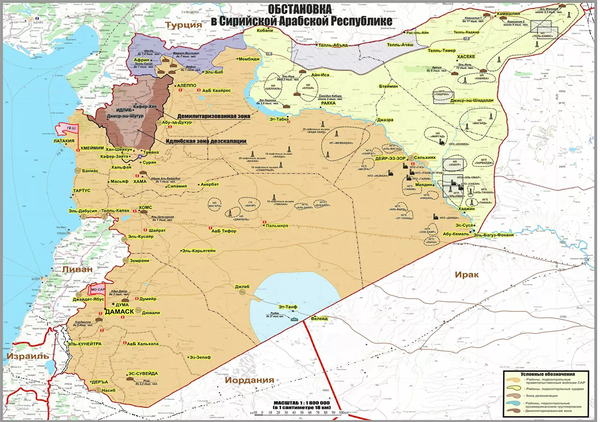
The Sooner Syria’s Energy Sovereign is Regained, the Better
For Syria to effectively cope with the immense financial and material challenge of rebuilding after a devastating war, oil and gas will be an absolutely vital tool. Last year, Syrian President Bashar Assad estimated that rebuilding could cost Syria between $200 and $400 billion, and take up to a decade to complete. With the US and its European allies refusing to commit funding to the reconstruction effort, and Syria’s major industrial cities including Aleppo either looted or severely damaged during the fighting, oil and gas production needs to serve as the literal lifeblood of reconstruction.
Therefore, by denying Syria the right to its own oil, the United States and President Trump are not only acting illegally (with US observers pointing out that such activities violate international laws against pillaging), but refusing the war-torn country the ability to rebuild from a brutal 8-year-long civil conflict which Trump's much criticised predecessors in the Obama administration helped to ferment and prolong.
Last week, commenting on Trump’s rhetoric, Assad said he had to hand it to the US president – notwithstanding the “criminal” nature of US politics against Syria, at least Trump “talks straight, [saying] ‘we need the oil’…What can be better than an honest enemy?” he asked.
*A terrorist group banned in Russia.

